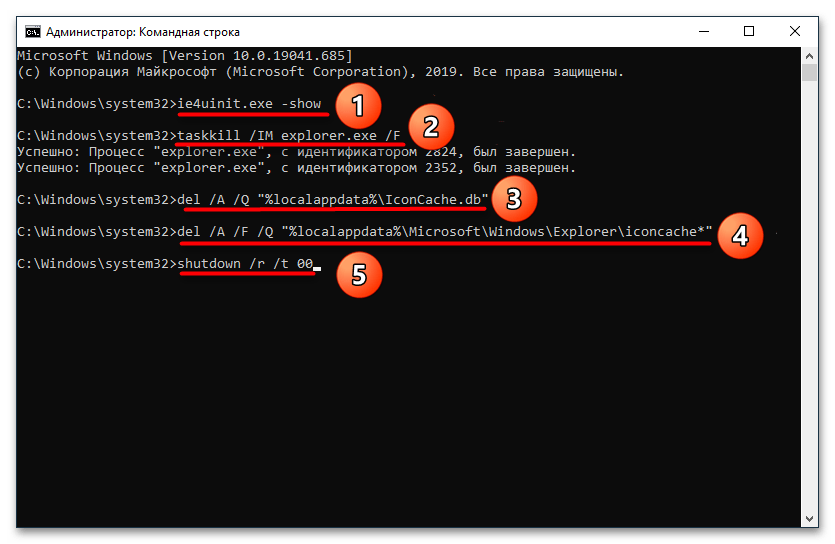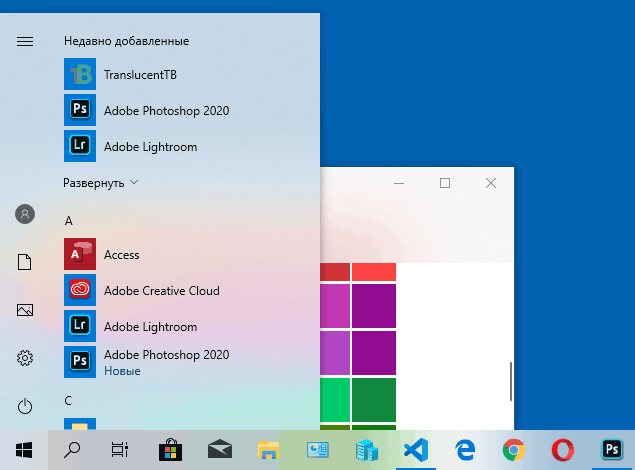Все способы:
- Способ 1: Сброс кеша значков
- Способ 2: Переустановка программ
- Способ 3: Перерегистрация Shell Experience Host
- Вопросы и ответы: 1
Способ 1: Сброс кеша значков
Проблемы с отображением значков на «Панели задач» нередко вызываются сбоями в работе «Проводника», а также повреждением кеша значков. В последнем случае эффективным решением будет сброса этого временного хранилища.
- Откройте из поиска Windows «Командную строку» от имени администратора.
- Последовательно выполните эти пять команд (после каждой нажимайте Enter):
ie4uinit.exe -showtaskkill /im explorer.exe /fdel "%localappdata%\iconcache.db"del "%localappdata%\Microsoft\Windows\Explorer\iconcache*"start explorer.exeилиshutdown /r /t 00
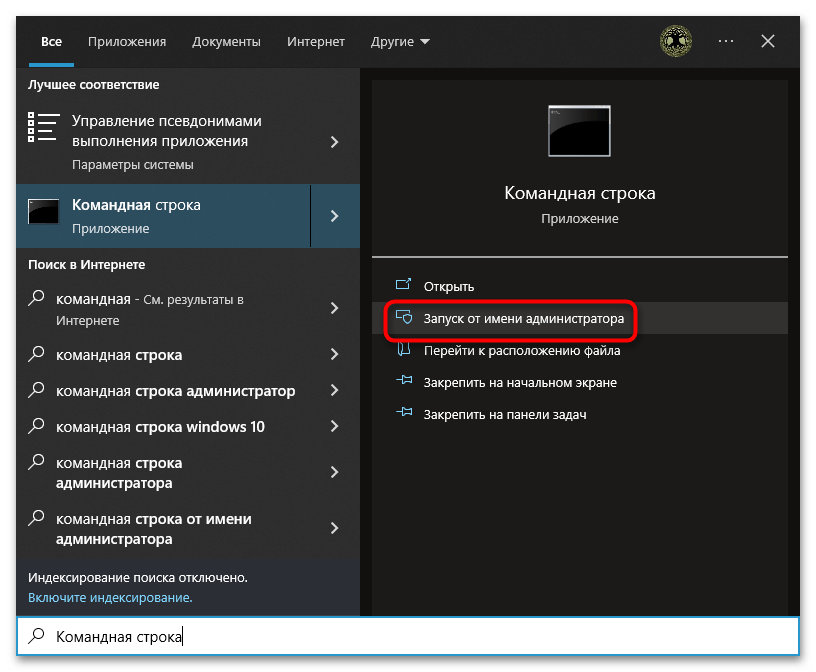
После выполнения второй команды работа «Проводника» будет завершена — так и должно быть, в противном случае удалить файлы DB не получится. Пятая команда запускает «Проводник», также вместо этого можно перезагрузить компьютер, используя второй вариант команды.
Перед выполнением указанных выше действий проверьте, имеются ли значки в папке %AppData%\Microsoft\Internet Explorer\Quick Launch\User Pinned\TaskBar. Если таковые отсутствуют, закрепите ярлыки программ из меню «Пуск», смотрите Способ 2.
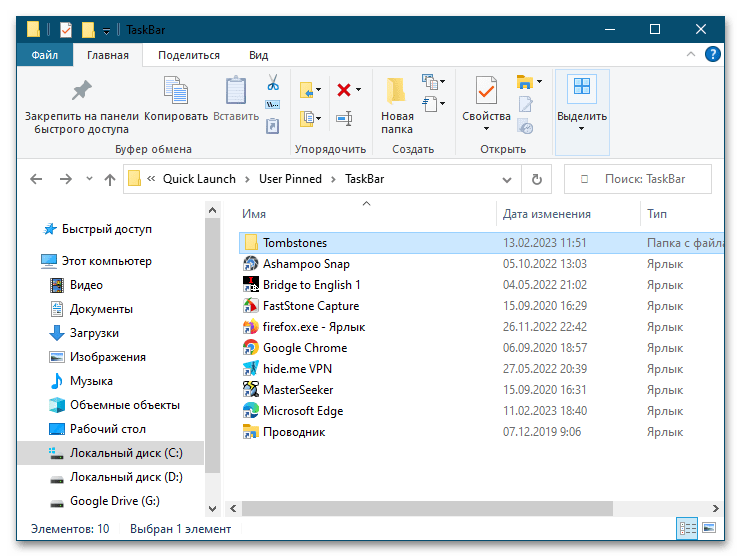
Способ 2: Переустановка программ
Если на «Панели задач» исчезли или стали пустыми значки определенных программ, попробуйте для начала перезайти в учетную запись или перезагрузить компьютер. Это исключит вероятность сбоя оболочки Windows 10. Если ситуация не изменится, выберите значок программы из меню «Пуск» и закрепите его на «Панели задач» из контекстного меню. В случае с пустыми значками, последние сначала необходимо открепить.
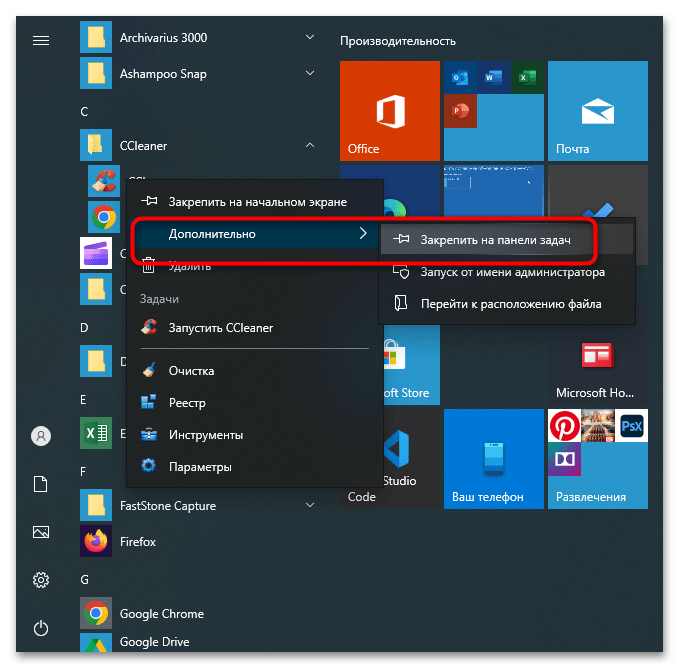
Наконец, можно переустановить приложение, иконка которого не отображается или отображается некорректно. Для удаления приложений лучше использовать специальные программы-деинсталляторы, убирающие не только основные файлы удаляемых приложений, но и оставляемый ими цифровой мусор.
Подробнее: Программы для удаления программ
Способ 3: Перерегистрация Shell Experience Host
Еще одной причиной проблем со значками «Панели задач» является повреждение программного модуля Shell Experience Host, отвечающего в Windows 10 за отображение универсальных приложений в оконном интерфейсе. Перерегистрируйте его.
- Запустите консоль «PowerShell» от имени администратора из контекстного меню кнопки «Пуск».
- Выполните команду
get-appxpackage -all *shellexperience* -packagetype bundle |% {add-appxpackage -register -disabledevelopmentmode ($_.installlocation + "\appxmetadata\appxbundlemanifest.xml")}. - Перезагрузите компьютер.
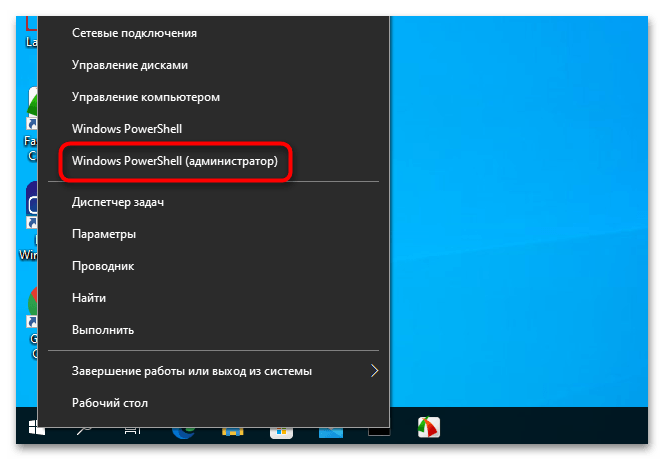

Если восстановить отображение значков на «Панели задач» не удается, при этом вновь закрепленные ярлыки исчезают после перезагрузки компьютера, откатите Windows 10 к ближайшей точке восстановления.
Подробнее: Откат к точке восстановления в Windows 10
Наша группа в TelegramПолезные советы и помощь
If you see white blank icons on Windows 11/10 Desktop, then it’s because the OS cannot load the icons attached to those programs and files. Windows maintains a database of icons which is used often instead of loading everything from the source. If that Icon Cache gets corrupted, then you will see these types of blank icons in Windows. In this post, we will share some suggestions on how you can fix the problem.
It may seem like a minor issue, especially with many who don’t keep anything on the desktop; however, the user experience is annoying. If you don’t have a shortcut on the taskbar, and you thought of launching from the Desktop, this will make you feel uncomfortable.
Follow these methods to resolve the problem.
- Delete IconCache
- Manually assign a new icon
- Reinstall Application or Software
You may need admin permission for the command prompt solution.
1] Delete IconCache
Windows maintains a database for all icons in the IconCache.db file. It is located at C:\%userprofile%\AppData\Local. You can delete it using the command line if it doesn’t work directly from Windows Explorer.
To rebuild the icon cache in Windows 10, you will have to follow this procedure:
- Open Command Prompt by typing cmd in the Start menu, and then choose to run as admin.
- First, navigate to the Local folder.
cd C:\%userprofile%\AppData\Local
- Once here, check if you can find the iconcache database by typing its name
- Now that you know it is there type the following to delete
del IconCache.db
- Right-click on the taskbar and switch to the Processes tab
- Locate Windows Explorer, right-click and choose to restart
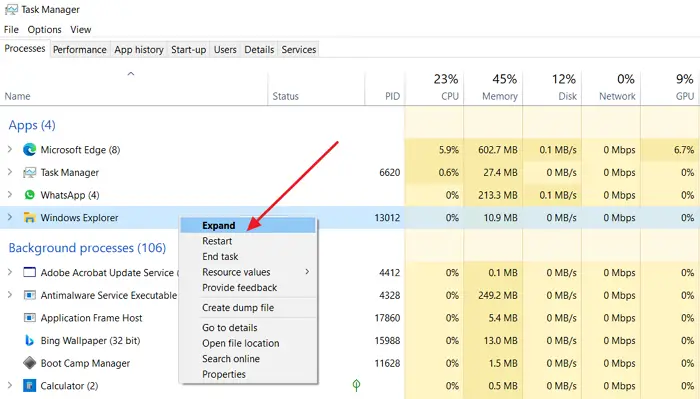
Next, you will have to navigate to the following folder:
C:\Users\%username%\AppData\Local\Microsoft\Windows\Explorer
Here you will see a lot of files like iconcache_32.db, iconcache_48.db, iconcache_96.db, iconcache_256.db, iconcache_1024.db, iconcache_1280.db, iconcache_1600.db, iconcache_1920.db, iconcache_2560.db, iconcache_exif.db, iconcache_idx.db, iconcache_sr.db, iconcache_wide.dd, iconcache_wide_alternate.db, etc.
Delete them all to purge and rebuild your icon cache in Windows 10.
This will force Windows to refresh iconcache, and remove the white blank icons. Refresh the Desktop, and the icons should be good.
Alternatively, you may want to use Thumbnail and Icon Cache Rebuilder, which lets you purge and rebuild Thumbnail & Icon Cache in a click.
Read: Desktop icons rearrange and move after reboot.
2] Manually assign a new icon
Windows Personalization allows you to change the icon of any shortcut or icon on the desktop.
- Right-click on the icon, and then select properties.
- Then click on the change icon.
- It will then open another window that will show the list of icons available for that program and other icons.
- Please select any of them, and then click on the ok button.
- Apply the changes, and white icons should be missing.
Read: Desktop Icons not working.
3] Reinstall the Program or Software
If a particular application whose icon is all white, it is possible that the program is not available on Windows. Double-clicking on the icon will reveal the problem. In this case, the straightforward way is to install the application icon and refresh it.
Read: Windows icon spacing messed up.
Missing icons on Windows is not something serious and happens from time to time. Make sure you get these solutions or replace them with an alternative icon so the user experience is not spoiled.
I hope the post was useful, and you were able to fix the white blank icons on Windows desktop issue.
Now read: Desktop icons slow to load.
How to fix white or blank Icons on the Windows 10 and 11 Desktop or Taskbar
Fix Icons quickly Windows 10 and 11
A single Command is enough to quickly repair the Icons on the Desktop
Press Windows Key + R and type:
Confirm with OK and the Icons flicker briefly and the defective Icon should now be displayed correctly again.
How-To create a new Bat File:
Right click on the Desktop -> New -> Text Document
Copy and save the Content from one of the List
Now right click on the new File and rename the File Extension form ".txt to .bat" or download one of my Releases
Clear the Icon Cache
@echo off
taskkill /f /IM explorer.exe
cd /d %userprofile%\AppData\Local\Microsoft\Windows
del /f /s /q Explorer\iconcache*.*
start explorer.exe
Clear the Thumbnail Cache
@echo off
taskkill /f /IM explorer.exe
cd /d %userprofile%\AppData\Local\Microsoft\Windows
del /f /s /q Explorer\thumbcache*.*
start explorer.exe
Clear Icon and Thumbnail Cache
The Icon and Thumb Cache contains all Icons in different Sizes starting from 16 px up to 2560 px.
Since these Caches are always in use, you can’t just right-click on iconcache.db or thumbcache.db to delete them.
@echo off
taskkill /f /IM explorer.exe
cd /d %userprofile%\AppData\Local\Microsoft\Windows
del /f /s /q Explorer\iconcache*.*
del /f /s /q Explorer\thumbcache*.*
start explorer.exe
Now simply copy this File into the user Folder C:\Users\Your Name and double-click there.
The Command will now be executed and the Cache cleared.
During execution it can happen that a File is not deleted with the Message «Access denied».
These Files then end up in the ThumbCacheToDelete Folder. After a Restart, these Files are also deleted.
Clear everything from the Explorer Folder
@echo off
taskkill /f /IM explorer.exe
cd /d %userprofile%\AppData\Local\Microsoft\Windows
del /f /s /q Explorer\*.*
start explorer.exe
Now simply copy this File into the User Folder C:\Users\Your Name and double-click there.
The Command will now be executed and the Cache cleared.
During execution it can happen that a file is not deleted with the message «Access denied».
These files then end up in the ThumbCacheToDelete folder.
After a restart, these files are also deleted.
If there is no change yet, then:
Right click on the Taskbar and start the Task Manager
Select explorer.exe there and press "Restart" at the bottom right.
If that doesn’t help either, then:
Windows Key + R
Enter shutdown -g -t 0 and restart the Computer.
Now the Icon Cache should have rebuilt itself and display everything.
Clear Icons in the Taskbar
Important: First remove the «broken» Shortcut from the Taskbar.
Enter Command Prompt in the search and right-click to start as Administrator.
Now enter/copy these Commands one after the other.
(Don’t be alarmed if the wallpaper disappears for a short Time)
taskkill /f /im explorer.exe
taskkill /f /im shellexperiencehost.exe
del %localappdata%\Packages\Microsoft.Windows.ShellExperienceHost_cw5n1h2txyewy\TempState\* /q
start explorer
The Wallpaper and the Icons are now visible again and the Icons in the Taskbar build up again. You should now be able to re-pin the new Shortcut and the Icon will be visible again.
Clear all Icons in the Taskbar — reset
If that doesn’t help either, it definitely helps if you delete the Icon Entries in the Taskbar and start over from Scratch.
A Batch File is sufficient for this.
DEL /F /S /Q /A "%AppData%\Microsoft\Internet Explorer\Quick Launch\User Pinned\TaskBar\*"
REG DELETE HKCU\Software\Microsoft\Windows\CurrentVersion\Explorer\Taskband /F
taskkill /f /im explorer.exe
start explorer.exe
Run the File with a double click.
The Desktop goes dark for a Moment and the Taskbar now rebuilds itself.
Now you can pin your Icons to the Taskbar again as you are used to.
(This does not affect the Start Menu Icon, Search, Widgets and the Icon for the virtual Desktops)
Clear Icons and Tiles in the Start Menu
@echo off
taskkill /f /im explorer.exe
taskkill /f /im shellexperiencehost.exe
timeout /t 3 /NOBREAK > nul
del %localappdata%\Packages\Microsoft.Windows.ShellExperienceHost_cw5n1h2txyewy\TempState\* /q
timeout /t 1 /NOBREAK > nul
start explorer
@echo on
Clear Icons and Tiles in the Start Menu — From Windows 10 1903
@echo off
taskkill /f /im explorer.exe
taskkill /f /im StartMenuExperienceHost.exe
timeout /t 3 /NOBREAK > nul
del %localappdata%\Packages\Microsoft.Windows.StartMenuExperienceHost_cw5n1h2txyewy\TempState\* /q
timeout /t 1 /NOBREAK > nul
start explorer
@echo on
Now double click on this File. When asked, confirm with Y for yes and have it done.
Among other things, explorer.exe is terminated and the three Files mentioned above are deleted.
After restarting explorer.exe, a new Cache is created.
For Explanation:
/f Also deletes read-only Files
/s Deletes all Files, including Subdirectories
/q There is no Query about the Wildcards
В Windows 10 последних версий присутствуют эффекты прозрачности для панели задач и меню «Пуск», а также для некоторых окон, например окна «Параметры». Обычно, они включены по умолчанию, но не всегда. Если вам нужно изменить настройки прозрачности, это можно сделать, хотя система содержит не так много опций для этого.
В этой инструкции подробно о включении и отключении прозрачности Windows 10, и о том, как настроить прозрачность, а точнее — увеличить прозрачность отдельных элементов. Примечание: при отсутствии установленных драйверов видеокарты (когда установлен «Базовый видеоадаптер»), прозрачность работать не будет.
- Как включить и отключить прозрачность Windows 10
- Настройка прозрачности панели задач
Как включить или отключить прозрачность Windows 10
В Windows 10 есть лишь одна встроенная опция, позволяющая включить или отключить прозрачность панели задач, меню «Пуск» и некоторых других элементов:
- Зайдите в Параметры (можно нажать клавиши Win+I).
- Перейдите в раздел «Персонализация» — «Цвета».
- Включите или отключите пункт «Эффекты прозрачности».
- В результате меню Пуск, панель задач и отдельные окна станут слегка прозрачными, как на скриншоте ниже.
По сути, это всё, что нам доступно для изменения на текущий момент времени. Встроенных средств, чтобы настроить уровень прозрачности, прозрачность для отдельных элементов и что-то ещё пока не предусмотрено. Но есть некоторые возможности, о которых — в следующем разделе руководства.
При желании вы можете изменить этот же параметр с помощью редактора реестра:
- Нажмите клавиши Win+R, введите regedit и нажмите Enter.
- Перейдите к разделу реестра
HKEY_CURRENT_USER\Software\Microsoft\Windows\CurrentVersion\Themes\Personalize
- В правой части окна редактора реестра обратите внимание на параметр с именем EnableTransparency. Когда его значение равно 1, прозрачность включена, при значении 0 — отключена. Менять значение можно по двойному клику с последующим вводом нужного значения.
Настройка прозрачности Windows 10 (как увеличить прозрачность панели задач и меню Пуск)
Как уже было отмечено, очевидных методов изменения параметров прозрачности в системе не предусмотрено. Но некоторые скрытые возможности у нас есть.
Первый метод — использование специальной настройки в реестре Windows 10:
- В редакторе реестра перейдите к разделу
HKEY_LOCAL_MACHINE\SOFTWARE\Microsoft\Windows\CurrentVersion\Explorer\Advanced
- В правой панели редактора нажмите правой кнопкой мыши и создайте новый параметр DWORD32 (даже для 64-бит систем) с именем UseOLEDTaskbarTransparency
- Дважды нажав по этому параметру, задайте значение 1 для него.
- Зайдите в параметры персонализации Windows 10, в разделе «Цвета» отключите и снова включите эффекты прозрачности.
- В результате прозрачность панели задач увеличится. Не слишком значительно, но заметно, особенно при использовании темной темы оформления.
Если такие полумеры вам не подходят, можно использовать сторонние программы для изменения прозрачности панели задач, среди них:
Программы сравнительно простые и каких-то проблем с их использованием возникнуть не должно. TranslucentTB позволяет не просто сделать панель задач полностью прозрачной, но и менять её цвет и прозрачность в зависимости от события: открытия меню Пуск, развертывания окна или открытия поиска.
Параметры как на скриншоте TaskbarTools делают панель задач полностью прозрачной и отключают эффекты размытия для находящегося позади неё изображения. Достаточно попробовать разные опции, чтобы добиться нужного результата. Ниже — пример 100% прозрачности.

Если вы можете предложить дополнительные возможности настройки прозрачности Windows 10, буду рад прочесть о них в комментариях.
Readers help support Windows Report. We may get a commission if you buy through our links.
Read our disclosure page to find out how can you help Windows Report sustain the editorial team. Read more
Some users have posted on Microsoft’s support forum about blank desktop icons. For those users, the Windows 10 desktop displays blank, white icons instead of software icons. Today’s guide will explore this issue and discuss how to fix blank icons in Windows 10.
Why do my desktop icons have no picture?
Regarding this problem, we have gathered users’ more common causes. These include:
- Corrupted files – This is a cause of many Windows problems. You may need to redownload or repair the files.
- Windows Explorer glitch – This error could result from a simple glitch in Windows Explorer. A restart might fix it.
- System bugs – These may happen more often than you imagine but are usually fixed with new update releases.
In some instances, Windows icons are not showing, but this issue can be quickly resolved by following the instructions from this guide.
Note that these solutions will work if the desktop icons show a blank page, blank squares, and for cases of Steam desktop icons blank, OneDrive desktop icons blank, and more.
How can I fix blank desktop icons?
1. Manually change icons
- First, try manually changing the blank icons on the desktop by right-clicking their software shortcuts and selecting Properties.
- Click the Change Icon button on the Shortcut tab.
- Then you can select an alternative icon on the Change Icon window.
- Alternatively, click Browse to choose a downloaded icon.
- Click the OK button.
- Select the Apply option. and press the OK button to exit the window.
2. Run DISM and System File Checker scans
- Click the Windows Start menu, input cmd, and select Run as administrator.
- Type the following command and press Enter:
DISM.exe /Online /Cleanup-image /Restorehealth - Then also, input the following command followed by Enter.
sfc /scannow - Wait for the system scan to finish. Restart Windows if it repairs system files.
Also, you can use a tool to run this scan more thoroughly. Using a specialized tool is faster and will repair damaged or corrupted files.
3. Rebuild the icon cache
- Open File Explorer by pressing the Windows key + E keyboard shortcut.
- Click the View tab, and select the Hidden items checkbox.
- Open the following path:
C:\Users\(your user folder)\AppData\Local folder - Click the IconCache.db file and press Shift + Del.
- Restart Windows 10 after deleting the IconCache.db file.
This process will automatically rebuild the icon cache and restore your icons, so the problem should be solved.
- Windows 11’s Start menu is not working? Here’s what to do
- FIX: Windows 10/11 desktop icons are too big/wide
- How to fix the red X mark on folders in Windows 10/11
- Windows 10/11 keeps refreshing? Here’s what you can do
4. Disable the tablet mode
- Press Windows + I and select System.
- Click Tablet mode on the left of the Settings window, and if tablet mode is selected, select Use desktop mode on the When I sign in menu.
- Restart Windows after selecting Use desktop mode.
5. Restart Windows Explorer
- Press Ctrl + Shift + Esc to open the Task Manager.
- Look for the Windows Explorer process and click on it.
- Click on the Restart button from the bottom right corner.
This procedure will reload the icon cache from File Explorer and its components. Consequently, your desktop icons should return to their original colors.
The above resolutions are among the most likely fixes for blank desktop icons. Many users have been able to fix desktop icons with the System File Checker or by rebuilding the icon cache.
If any of your icons are corrupted, check out our detailed guide on the topic. And do not forget to go through some easy ways to save the desktop layout in Windows.
If these fixes aren’t enough to resolve the problem, we recommend that you try restoring or resetting Windows 10.
Let us know which solution worked for you in the comments area below.
Matthew Adams
Windows Hardware Expert
Matthew is a freelancer who has produced a variety of articles on various topics related to technology. His main focus is the Windows OS and all the things surrounding it.
He is passionate about the tech world, always staying up-to-date with the latest and greatest. With an analytical view, he likes problem-solving, focusing on errors and their causes.
In his free time, he likes to read and write about history and tries to always develop new skills.

